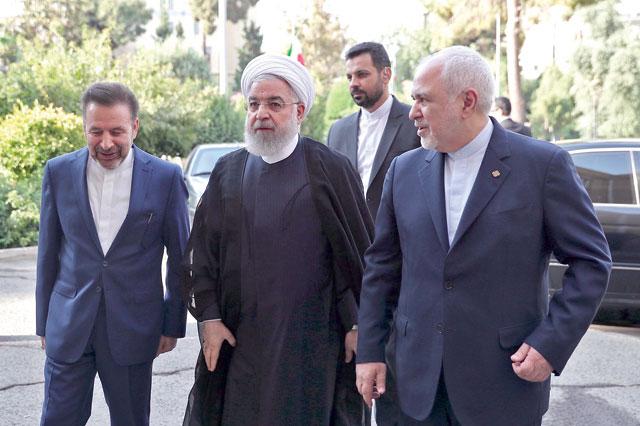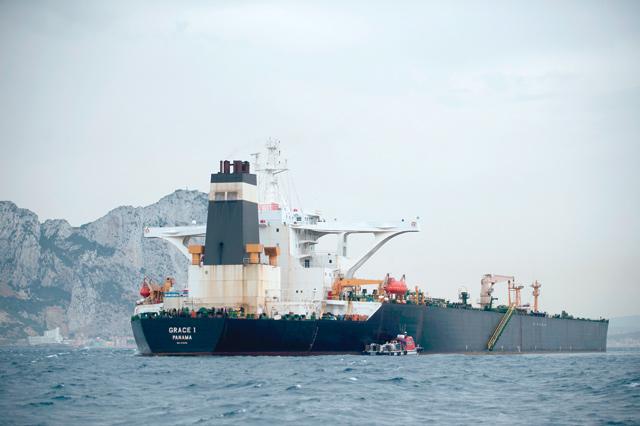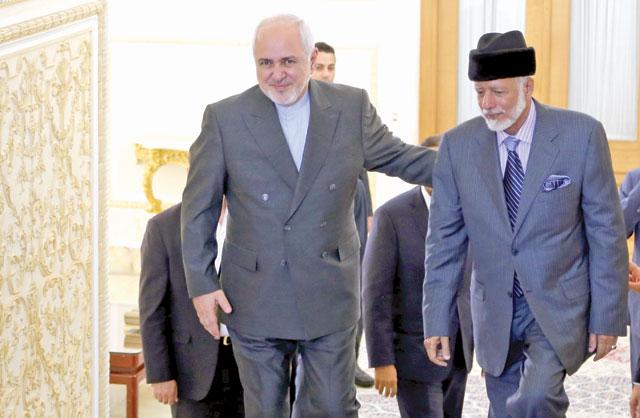You are here
Iran 'favours' talks despite Trump snub
By AFP - Aug 06,2019 - Last updated at Aug 06,2019

This handout photo provided by the Iranian presidency shows President Hassan Rouhani (centre) walking with his top diplomat, Mohammad Javad Zarif (right), and deputy foreign minister, Abbas Araghchi (left), before their meeting at the foreign ministry in Tehran on Tuesday (AFP photo)
TEHRAN — President Hassan Rouhani said on Tuesday that Iran favours talks with the US if it lifts sanctions against the Islamic republic, despite his top diplomat turning down a meeting with US President Donald Trump.
Rouhani said "peace with Iran is the mother of all peace" and "war with Iran is the mother of all wars" as he defended a landmark 2015 nuclear deal between Tehran and world powers.
"Iran favours talks and negotiations and, if the US really wants to talk, before anything else it should lift all sanctions," Rouhani said in remarks aired live on state television.
Tensions between Iran and the US have been rising since Trump unilaterally withdrew the US from the nuclear deal in May 2018 and began imposing sanctions as part of a "maximum pressure" campaign.
But Rouhani said Iran was ready for talks regardless of whether or not the US was party to the deal, formally known as the Joint Comprehensive Plan of Action (JCPOA).
“Whether they want to come into the JCPOA or not, it’s up to them,” said Rouhani.
He urged the US to lift all its sanctions and accused it of committing “economic terrorism” by blocking food and medicine imports.
In response, US ambassador on disarmament Robert Wood said Iran “simply needs to make up its mind to decide what it wants to do”.
“My president has said he is willing to sit down and have a discussion with Iran. We are not sure Iran wants to have that discussion,” he said on the sidelines of a conference in Geneva.
Trump has said several times he is willing to hold talks with Iran even as he lambasts its leadership as corrupt, incompetent and a threat to regional security and US interests.
But Washington imposed sanctions against Foreign Minister Mohammad Javad Zarif on Wednesday, targeting any assets he has in the US and squeezing his ability to function as a globe-trotting diplomat.
Zarif on Monday confirmed reports he had earlier declined an offer to meet Trump at the White House last month, despite the threat of sanctions.
Rouhani on Tuesday described the US approach as “weird”.
“So how should we negotiate?” he said. “The person in charge of negotiations is the foreign minister. He must talk to you.”
‘Warmongers’ deceived Trump
Twelve months on from the US withdrawal, Iran responded by suspending some of its commitments under the nuclear deal.
The situation threatened to spiral out of control with ships attacked, drones downed and oil tankers seized.
At the height of the crisis, Trump called off air strikes against Iran at the last minute in June after its forces shot down a US drone.
Rouhani, with Zarif sitting beside him, defended the foreign minister despite criticism from hardliners over his role in the deal, ultimately abandoned by the US.
“We had so many economic victories [in the wake of the deal] that it enraged some people,” he said.
Rouhani said the US had made a mistake by thinking days of deadly protests in December 2017, reportedly sparked by austerity measures, would weaken the country.
“They thought Iran’s system is weakened,” he said. “They said, ‘One more push. Iran has reached a stage where if we give it another push, everything will be over’.”
This push by “warmongers” deceived Trump and prompted his decision to leave the nuclear deal, Rouhani said.
‘Oil for oil’
Rouhani later spoke by phone with French President Emmanuel Macron and voiced support for further cooperation between Iran and Europe, according to the government’s official website.
But “unfortunately, simultaneous with Iran and France’s attempts to reduce tensions and create favourable conditions for peaceful coexistence in the region, we witness escalatory moves from the US,” Rouhani told Macron.
In his earlier televised remarks, Rouhani urged the US to be ready to negotiate fairly.
“Peace for peace and oil for oil,” he said. “You cannot say that you won’t allow our oil to be exported.”
“It cannot be that the Strait of Hormuz is free for you and the Strait of Gibraltar is not free for us.”
Iran has also been locked in a high-seas standoff with US ally Britain since Royal Marines helped to seize a tanker carrying Iranian oil off the British overseas territory of Gibraltar on July 4.
Weeks later, Iran’s Revolutionary Guards impounded a British-flagged tanker in the Strait of Hormuz — the conduit for much of the world’s crude.
Separately on Tuesday, Iran’s military unveiled three precision-guided missiles, with Defence Minister Amir Hatami saying they showed the country was ready to defend itself in the face of US “viciousness and conspiracies”.
Related Articles
GIBRALTAR — Gibraltar's Supreme Court on Thursday ruled in favour of releasing an Iranian supertanker seized on suspicion of shipping oil to
TEHRAN — Iran's neighbours have made talks impossible through their "hasty and arrogant moves", a top security official told Oman's foreign
TEHRAN — Iran said Tuesday it will further free itself from the 2015 nuclear deal in defiance of new American sanctions as US President Dona


















